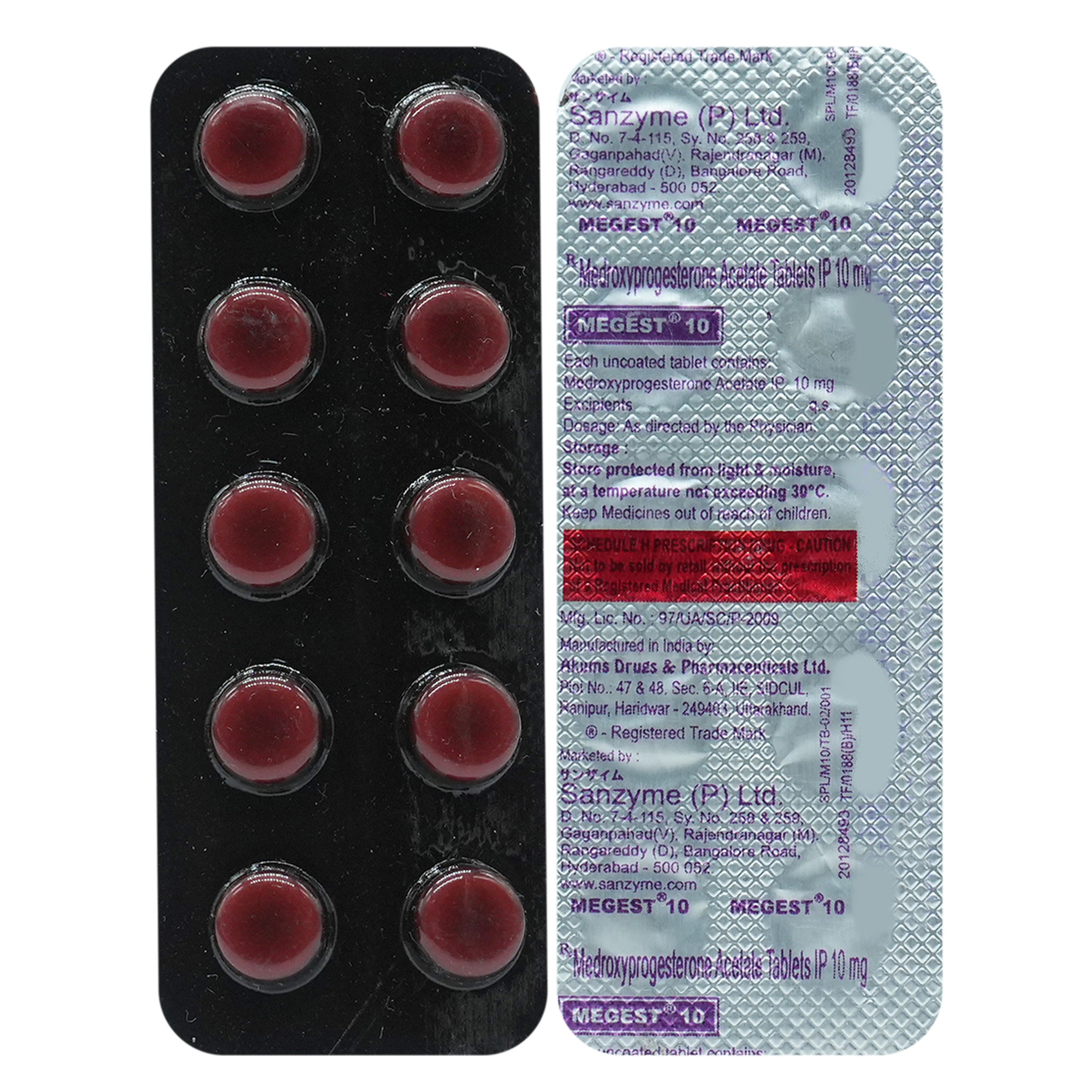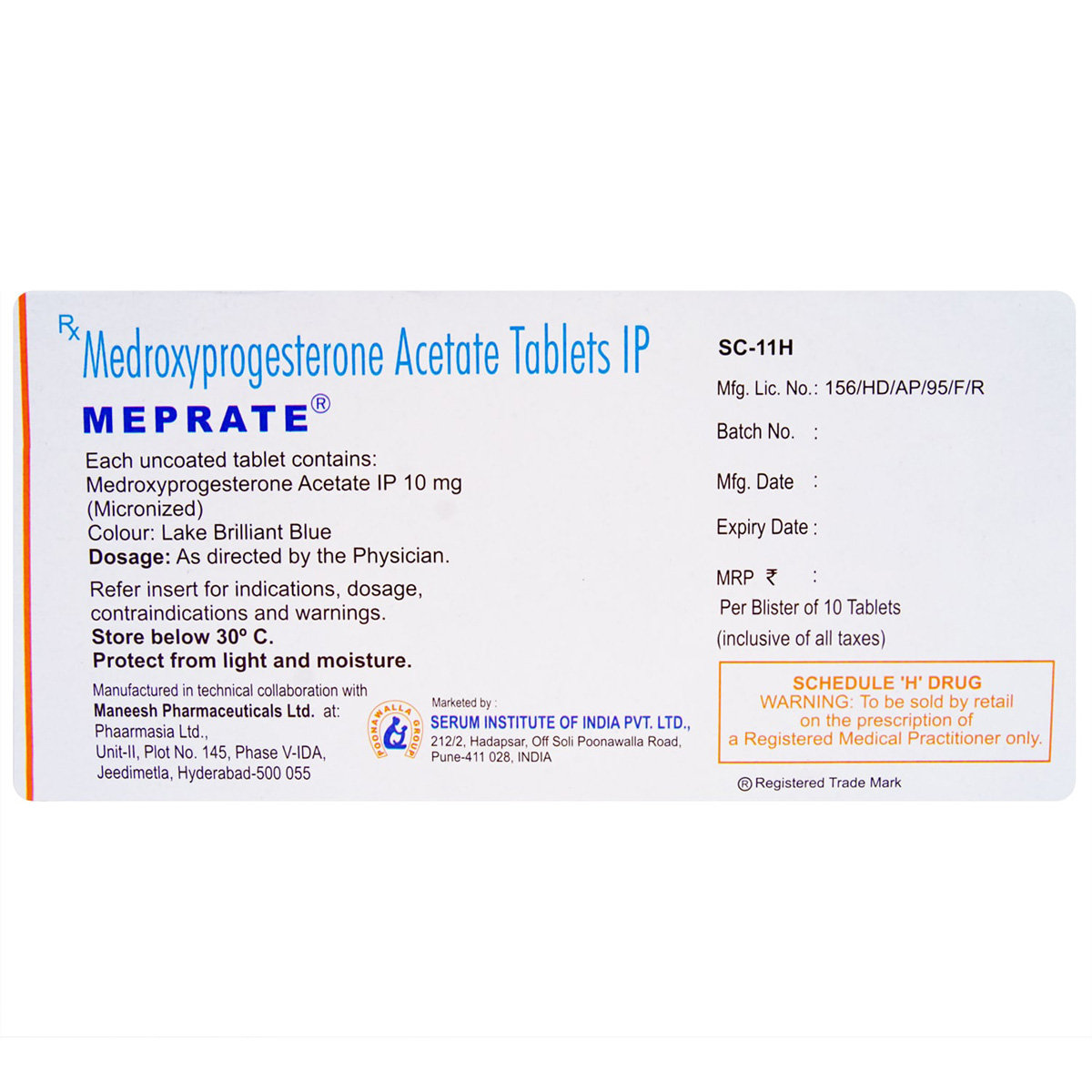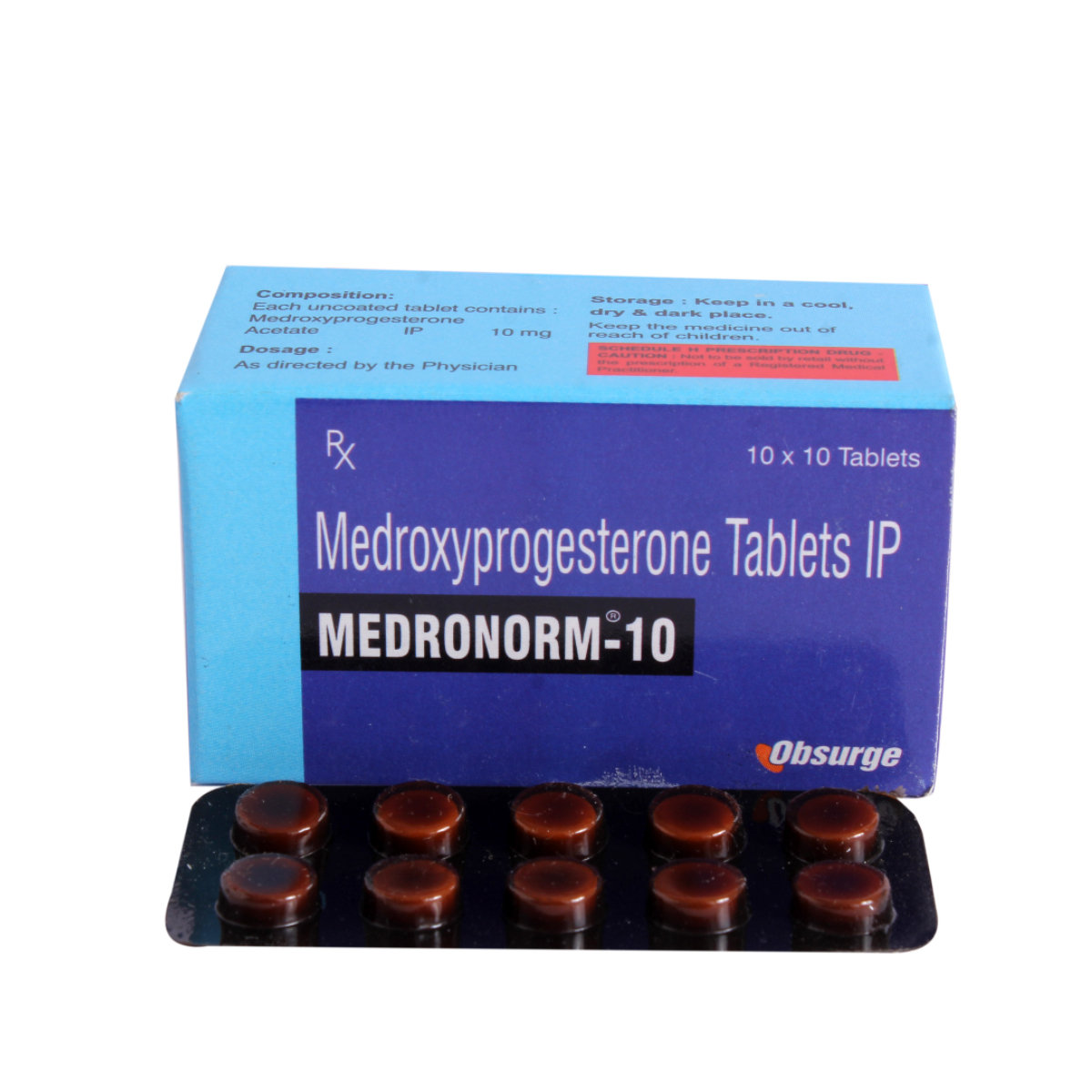Medroxyprogesterone
About Medroxyprogesterone
Medroxyprogesterone is a female hormone known as progestin (a form of progesterone) that regulates ovulation (the release of an egg from an ovary). It treats the absence of menstrual periods (amenorrhea) and abnormal uterine bleeding. Besides this, it also prevents endometrial hyperplasia (thickening of the uterine lining with the risk of cancer) and overgrowth in the lining of the uterus in postmenopausal women who are receiving estrogen hormone replacement therapy.
Medroxyprogesterone contains medroxyprogesterone. Medroxyprogesterone works by replacing the normal hormone medroxyprogesterone functions in the body and treating associated symptoms.
Your doctor will advise your dose and how often you need to take this medication based on your medical condition. You may sometimes have breast tenderness, swelling in other body parts, headaches, migraines, mood swings, depression, acne, tummy (abdominal) pain, back pain, and vaginal bleeding. Most of these side effects of Medroxyprogesterone do not require medical attention and gradually resolve over time. However, if the side effects are persistent, reach out to your doctor.
Try not to stop taking this medicine of your own. Using Medroxyprogesterone may increase the risk of blood clots. Make sure that before taking this medicine, you inform your doctor if you have or have had breast cancer, unusual bleeding in the vagina, liver disease, or any other health problems. If you are taking any other medicine or are allergic to any medication, please inform your doctor. Avoid smoking and alcohol to prevent any kind of unpleasant side-effect. Medroxyprogesterone should not be used in heart disease or dementia patients because this medicine may increase your risk of developing these conditions.
Uses of Medroxyprogesterone
Medicinal Benefits
Medroxyprogesterone is a female hormone that regulates ovulation and menstruation in women. Medroxyprogesterone helps in initiating the menses cycle (periods) in women who have not yet reached menopause. Besides this, it prevents overgrowth of the uterus in postmenopausal women who take estrogen as hormone replacement therapy (HRT). Medroxyprogesterone is used to prevent thickening of the uterine lining in postmenopausal women receiving estrogens who have not removed their uterus through surgery. It also helps treat amenorrhea (cessation or irregular menses cycle for more than three months). It is also given in combination with estrogens as part of menopausal replacement therapy. The injection form of Medroxyprogesterone is prescribed for treating abnormal uterine bleeding along with irregular or ceased menstrual cycles. The intravaginal gel form of Medroxyprogesterone assists in reproductive technology for infertile women with progesterone deficiency or irregular or ceased menstrual cycle. The vaginal insert form of Medroxyprogesterone supports early pregnancy and implantation of an embryo in the uterus. Off-label use of Medroxyprogesterone helps in reducing the risk of preterm birth.
Directions for Use
Storage
Side Effects of Medroxyprogesterone
- Headache
- Breast pain
- Irregular vaginal bleeding or spotting
- Stomach/abdominal cramps
- Bloating
- Nausea
- Vomiting
- Hair loss
- Fluid retention
- Vaginal yeast infection
Drug Warnings
Medroxyprogesterone with estrogen should not be used to prevent heart disease, heart attacks, strokes, or dementia. Using Medroxyprogesterone with estrogen may increase the chance of getting heart attacks, strokes, breast cancer, and blood clots. In some cases, using Medroxyprogesterone with estrogen may produce dementia among women aged 65 and older. Do not use Medroxyprogesterone if you are allergic to peanuts, have unusual vaginal bleeding, have had any cancer (breast or uterus cancer), or undergoing estrogen plus progestin treatment. Tell your doctor before using Medroxyprogesterone if you have had a heart attack, stroke, blood clot, liver problems, kidney problems, are pregnant, breastfeeding or planning to get pregnant, asthma (wheezing), epilepsy (seizures), diabetes, migraine, endometriosis, lupus, heart problems, thyroid, or have high calcium levels in your blood. Use caution while driving a motor vehicle, as dizziness or drowsiness may occur. Tell your doctor about this if you use Medroxyprogesterone before lab tests or biopsies, as it can affect the report values. Diagnostic tests of blood coagulation, thyroid, cholesterol, and glucose metabolism results might affect people using Medroxyprogesterone.
Drug Interactions
Drug-Drug Interactions: This medicine interacts with anticonvulsants (such as acetazolamide and carbamazepine), anti-infectives (metronidazole, clindamycin) and herbal preparation (like Ginkgo Biloba and St. John’s wort plant).
Drug-Food Interactions: Medroxyprogesterone may interact with grapefruit, Ginkgo biloba herbal supplements and St. John’s wort plant (used for anti-depression).
Drug-Disease Interactions: Medroxyprogesterone should not be given in the condition of abnormal genital bleeding, low level of bone minerals, breast cancer, liver disease, and thromboembolism (blood clot problem).
Drug-Drug Interactions Checker List:
Safety Advice

Alcohol
cautionThere is not enough scientific data available for Medroxyprogesterone interaction with alcohol; hence, it is best to consult a doctor.

Pregnancy
cautionContact the doctor before using Medroxyprogesterone. Your doctor will decide whether Medroxyprogesterone should be given to the pregnant woman or not, depending on her condition.

Breast Feeding
safe if prescribedClinical evidence suggests that Medroxyprogesterone may pass into breast milk, but its risk is not established. So it is better to contact the doctor before using Medroxyprogesterone.

Driving
unsafeIt is advised to drive with caution after taking Medroxyprogesterone as it may interfere with driving capabilities. It can make you feel drowsy.

Liver
cautionMedroxyprogesterone should be taken with caution, especially if you have a history of liver diseases/conditions. The dose may have to be adjusted by your doctor.

Kidney
cautionThere is not enough scientific data available for Medroxyprogesterone interaction with the kidney; hence it is best to consult a doctor.

Children
unsafeMedroxyprogesterone is not recommended for children below 12 years of age.
Habit Forming
Diet & Lifestyle Advise
- Do regular exercise and physical activity to minimize hot flushes and improve sleep. Besides this, weight-bearing exercises can help in making your bones strong. Aerobics, yoga, and activities like tai chi may help in relaxing the body and mind.
- Try to wear loose clothes before going to bed and sleep in a cool, well-ventilated room. Doing this can prevent symptoms of hot flushes and night sweats. Take a minimum sleep of 8 hours.
- Avoid or limit intake of caffeine-containing beverages, alcohol, and spicy food, as these are known triggering agents for hot flushes.
- Try to be stress-free to improve your mood swings due to hormonal fluctuations.
- Quit smoking as it will help to reduce hot flushes and your risk of developing chronic conditions like heart disease, stroke, and cancer.
- Try to apply vaginal lubricant or moisturizer if you have vaginal dryness.
Special Advise
- Talk with your doctor regularly about whether you should continue taking Medroxyprogesterone. The addition of a Medroxyprogesterone is generally recommended for women who have a chance of getting uterus cancer.
- Tell your doctor if you get vaginal bleeding while taking Medroxyprogesterone.
- Try to have a yearly pelvic exam, breast exam and mammogram (breast X-ray) unless your doctor tells you otherwise. If your any family members have had breast cancer or breast lumps, or an abnormal mammogram. Your doctor may ask you to have breast exams more often.
- Before using this medication, let your doctor know if you have high blood pressure (hypertension), high cholesterol (hyperlipidemia), diabetes, or obesity (BMI more than 25). If you use tobacco, you may have a higher chance of getting heart disease. Ask your doctor for ways to lower your chance of getting heart disease.
Patients Concern
Disease/Condition Glossary
Female Infertility: When a woman is not able to become pregnant within a year of trying. If a woman gets pregnant but experiences miscarriages or stillbirths, it is also included in infertility.
Hormone replacement therapy (HRT): It is a treatment to relieve symptoms of menopause. It replaces hormones that are at a lower level as you approach menopause.
Premenstrual syndrome (PMS): PMS is the name for the symptoms women can experience in the weeks before their period. Each woman's symptoms are different and can vary from month to month. The most common symptoms of PMS include mood swings, feeling upset, anxious or irritable, tiredness or trouble sleeping, bloating or tummy pain, breast tenderness, headaches, spotty skin or greasy hair, changes in appetite and sex drive, etc.
Endometriosis: It is an often painful disorder in which tissue similar to the tissue that normally lines the inside of your uterus. Common signs and symptoms of endometriosis include painful periods (dysmenorrhea), pain with intercourse, pain with bowel movements or urination, excessive bleeding infertility, etc.
FAQs
Medroxyprogesterone helps in preparing the endometrium potential for pregnancy after ovulation. It thickens the lining of the endometrium to accept a fertilized egg. It also prevents muscle contractions of the uterus that would reject an egg in the uterus. So, if the body has a high progesterone level, ovulation will not occur then.
Abnormal uterine bleeding, irregular or missed periods (amenorrhea), abdominal pain during pregnancy, and frequent miscarriages are the signs of low progesterone. Additionally, low progesterone levels lead to high levels of estrogen, and women can have decreased sex drive, weight gain, or gallbladder problems.
Yes, Medroxyprogesterone may cause weight gain. It can be due to water retention. If you feel that you are gaining a lot of weight while taking Medroxyprogesterone, please consult your doctor.
Do not use Medroxyprogesterone if you are allergic to peanuts, have unusual vaginal bleeding, have had any cancers (breast or uterus cancer), or undergoing estrogen plus progestin treatment. Tell your doctor before using Medroxyprogesterone if you had a heart attack, stroke, blood clot, liver problems, pregnant, breastfeeding, or planning to get pregnant or allergic to Medroxyprogesterone.
No, Medroxyprogesterone is not a contraceptive. It should not be used as an effective form of birth control to prevent pregnancy.
Medroxyprogesterone should be taken in the dose and duration as prescribed by the doctor.
Yes, Medroxyprogesterone is a synthetic pregnant steroid and a derivative of progesterone.
Less serious but common side effects of Medroxyprogesterone include headache, breast pain, irregular vaginal bleeding or spotting, stomach/abdominal cramps, bloating, nausea and vomiting, hair loss, fluid retention, and vaginal yeast infection.







